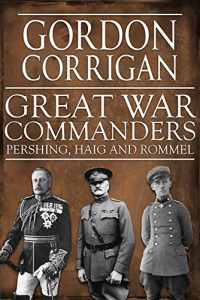Three great commanders in one Great War.
Great War Commanders Haig, Pershing and Rommel by Gordon Corrigan is an omnibus of three of his military bibliographies, Douglas Haig: Defeat Into Victory, General Pershing: Winning At All Costs and Rommel’s Great War.
Haig is to be blamed for the death of a million British soldiers in The Great War. Or is he?
Spurred on by the scapegoating of politicians and generals in the 1930’s, his critics claim he had poor leadership skills on the western front, a leader only due to his social connections.
As disclosure rules of The Great War are finally expired, do the files support these claims against Haig?
And if not, why do people believe them to be true?
Corrigan urges his reader to judge Haig in the context of his time, as they read through his attempt to extract the truth, to prove or quell the legend surrounding Douglas Haig.
In his second section Corrigan focuses on John Joseph Pershing, the son of a farmer/business man, born in 1860.
Pershing achieved the highest rank in his lifetime than any other American soldier, General of the Armies, a newly introduced six star rank.
After impressing President Theodore Roosevelt through his gallantry in the 10th Cavalry, he made a quick decent through the ranks, overtaking over 800 senior to him.
Pershing can be said to have aided the Great War effort against the Germans immensely, transforming an ill-equipped army into heroes.
Corrigan describes how he commanded the American Expeditionary Force, and was then able to play a key part in the closing stages of the war.
So how can such a respected hero be so strongly disliked?
Corrigan reveals how his high standards, strict discipline and withdrawn personality, made him unpopular at war.
Yet the death of his wife and children in a San Francisco fire and his initial struggle for leadership proves that his life was not always that easy.
The third section titled Rommel’s Great War reveals the life of Erwin Rommel before he rose to military fame as a field marshal in World War Two.
Corrigan gives the reader a detailed and thoroughly researched insight into his family history, revealing that he was not from a military background. His father, a schoolmaster bizarrely forced him into the army, along with his brother Karl.
Once in the army was turned down by the Artillery and Engineers, despite his interest in mathematics and physics. His fate was set when he joined the Infantry, but did not shine in the Royal Officer Cadet School.
So how did Rommel because The Desert Fox we have all heard about?
Corrigan illustrates Rommel’s experiences of World War One in the trenches, as well as in combat. Additionally focusing on the rise of Hitler and the Nazi party.
How did Rommel come to become seduced by their ideology, like many other intelligent individuals?
Praise for Gordon Corrigan:
‘Political, fluent, well-researched and extremely argumentative’ – Andrew Roberts.
'Meticulously researched and well-written' - Pennant
Major Gordon Corrigan is a retired Gurkha officer, a member of the British Commission for Military History and Fellow of the Royal Asiatic Society. He is now a freelance military historian and battlefield lecturer. He is a well known figure on the History channel. He is also the author of Sepoys in the Trenches, Loos: 1915, Douglas Haig: Defeat Into Victory, General Pershing: Winning At All Costs and Wellington: A Military Life.
Endeavour Press is the UK's leading independent digital publisher. For more information on our titles please sign up to our newsletter at www.endeavourpress.com. Each week you will receive updates on free and discounted ebooks. Follow us on Twitter: @EndeavourPress and on Facebook via http://on.fb.me/1HweQV7. We are always interested in hearing from our readers.






